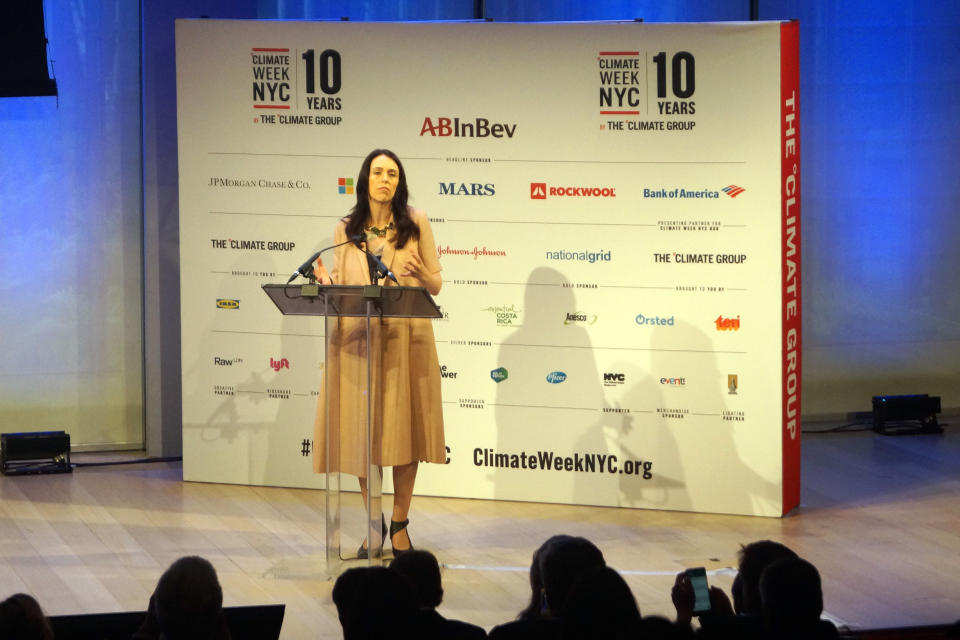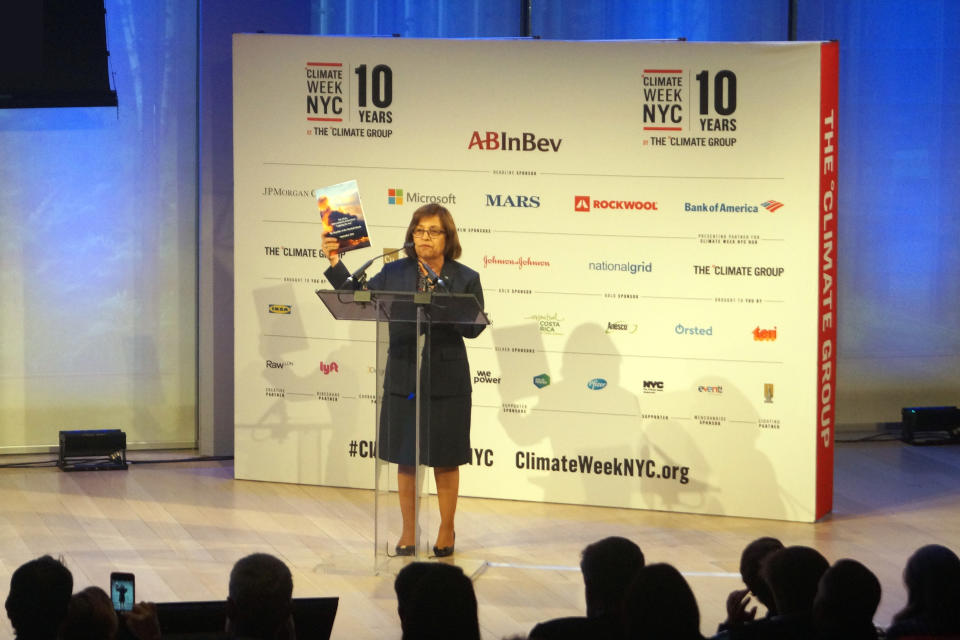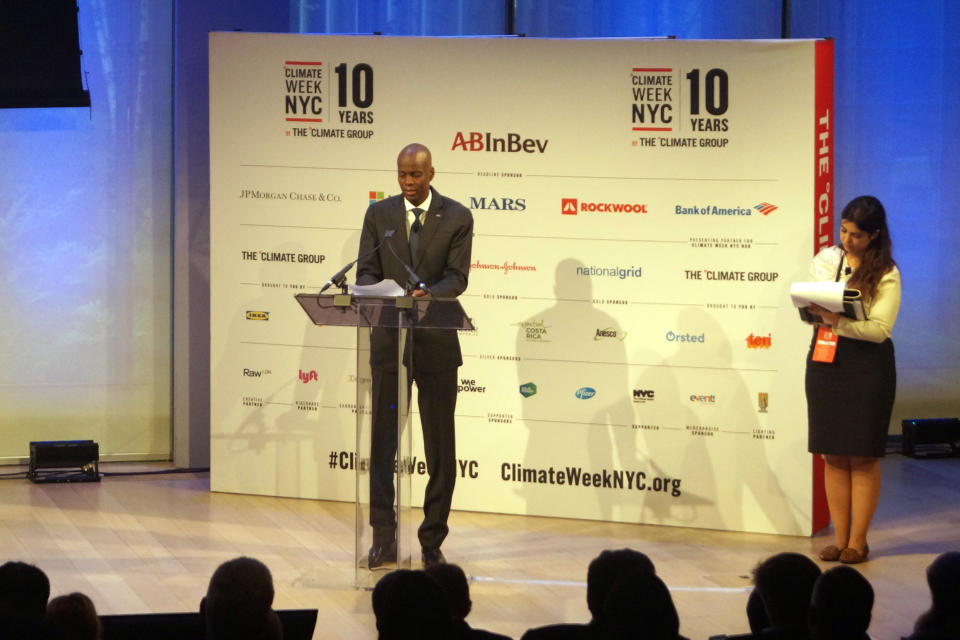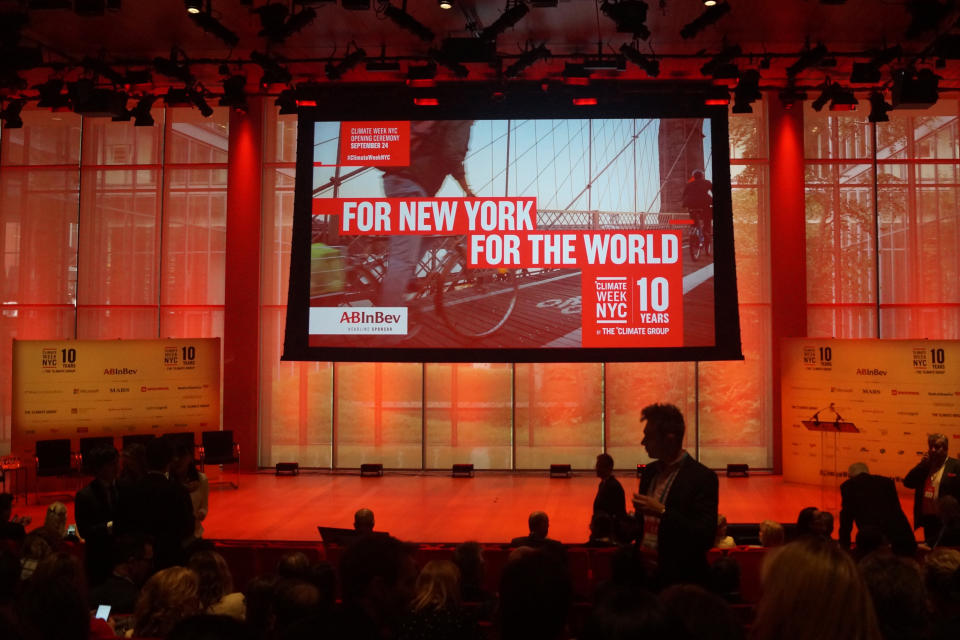Climate Week kicks off with a plea from island nations threatened by global warming

Leaders from island nations vulnerable to the impacts of climate change said Monday the whole world is facing a threat to its survival and warned that mitigation alone is an inadequate response.
Business leaders, government ministers and presidents gathered in Manhattan for the opening ceremony of Climate Week, an annual summit hosted by the Climate Group, the United Nations and New York City that coincides with the U.N. General Assembly.
New Zealand Prime Minister Jacinda Ardern, President of the Marshall Islands Hilda Heine and Haiti President Jovenel Moïse bore witness to the impacts of climate change.
“The challenge of climate change requires us to look beyond the domestic. Our duty of care is as global as the challenge of climate change itself. In the Pacific we feel that acutely, as do countries like Bangladesh where land is literally being lost and fresh water is being inundated with saltwater,” Ardern said in the Times Center’s 378-seat auditorium near Times Square.
Climate Group CEO Helen Clarkson, who kicked off the ceremony, later told Yahoo News that many nations are feeling record temperatures, but these leaders are distinctly qualified to say, “Look at what’s happened to us” and illustrate what’s on the horizon for others.

At the event, Ardern announced that New Zealand plans to spend at least $300 million in climate-related development assistance over the next four years — with the majority of that funding focused on practical actions such as coastal adaptation, water security, rainwater harvesting and desalination.
“These are not hypothetical questions. They are immediate questions of survival,” Ardern said. “Although New Zealand accounts for a tiny percentage of global emissions — less than 0.2 percent — we recognize the importance of doing our part. More importantly, we recognize that global challenges recognize everyone’s attention and we all have a responsibility.”
She said New Zealand’s minister on climate change, James Shaw, is working on a zero-carbon bill — which would be fully aligned with the Paris Agreement’s objectives — this week back home. New Zealand aims to use 100 percent renewable energy by 2035 and plant one billion trees over the next decade, Ardern said.
“When you’re a population of 4.5 million people, that is a lot of trees,” Ardern said. “And we are no longer issuing permits for offshore oil and gas exploration.”
Heine announced at the opening ceremony that the Marshall Islands are launching a strategy to reach net-zero emissions by 2050.

“We are only the tenth country to produce a 2050 strategy and the first island nation to do so,” Heine said. “This strategy sets out a concrete pathway for the country to reach our long-held vision of net-zero emissions and climate resilience.”
Named “Tile Til Eo” (Marshallese for “lighting the way”), the strategy lays out the responsibilities for her successors in the coming decades and commits to making a national adaptation plan in 2019 to address the Marshall Islands’ uniquely vulnerable position as a nation of 1,156 individual islands and 29 atolls where the average elevation is just six feet above sea level. Heine said Tile Til Eo is “a living document” that will be updated and enhanced every five years based on new experiences and information.
“I challenge you all to develop your own vision to fully decarbonize by 2050,” Heine told attendees from developed nations. “If we can do it, so can you.”
Heine said that the Paris Agreement will never succeed in limiting the increase in average global temperature to less than 2°C if other nations do not follow suit.
“If you ever want to steer a ship through troubled waters, ask an islander to take the helm,” Heine said.

Moise, who was an entrepreneur before becoming the president of Haiti, said he is well aware that the Caribbean is a significant economic hub with enormous potential for investment in renewable energies like wind and solar power. Cuba, Haiti and the Dominican Republic, with more than 35 million inhabitants, are the three most populous countries in the region.
He said it’s self-evident that disaster preparedness is not sufficient to avoid severe damage in island countries like Haiti or the U.S. coasts, and limited his remarks to shared humankind’s responsibility and the role of capitalism in climate action.
“I urge you to put your money where your mouth is,” Moise said in French. “Act now to reduce emissions in the short and medium term and in the long term eliminate emissions by investing in green renewable energy sources. Haiti stands ready to welcome you with open arms to both invest in green energy and do good for the planet at the very same time.”
The Americans hosting Climate Week NYC are in an odd position. Though they support climate action, their president does not. President Trump, who dismisses climate change as a hoax, announced in June 2017 that he was beginning that process of withdrawing the U.S. from the Paris Agreement. Under the accord, a country is permitted to submit its withdrawal three years after it entered into force for that party, which was Nov. 4, 2016, for the U.S. This means Trump needs to wait until Nov. 4, 2019, to formally request the nation’s removal and it would not become official until Nov. 4, 2020.
Although climate change doesn’t surpass the economy or terrorism as the most pressing issue in the minds of most voters throughout the U.S., it is increasingly becoming a serious concern — particularly for coastal communities at risk from rising sea levels.

California Gov. Jerry Brown, who hosted the Global Climate Action Summit in San Francisco this month; Mexican diplomat Patricia Espinosa, the executive secretary of the United Nations Framework Convention on Climate Change, and Peru President Martín Vizcarra also addressed Monday’s opening ceremony — arguing that time is a dwindling resource.
“Just pick the news up today. You won’t see anything about climate change,” Brown said. “There’s a lot of news, but there’s not much news on the very topic we’re talking about, which is an absolute existential necessity for the continuation of our civilization as we know it.”
“Climate change is an opponent we shaped with our own hands,” Espinosa said, “but whose power now threatens to overwhelm us.”
Climate Week NYC will continue until Sunday, Sept. 30.

_____
Read more from Yahoo News:



